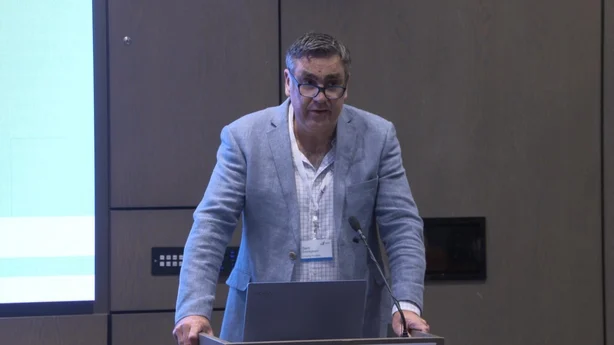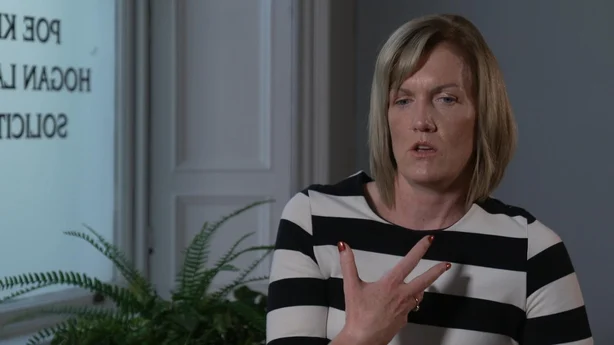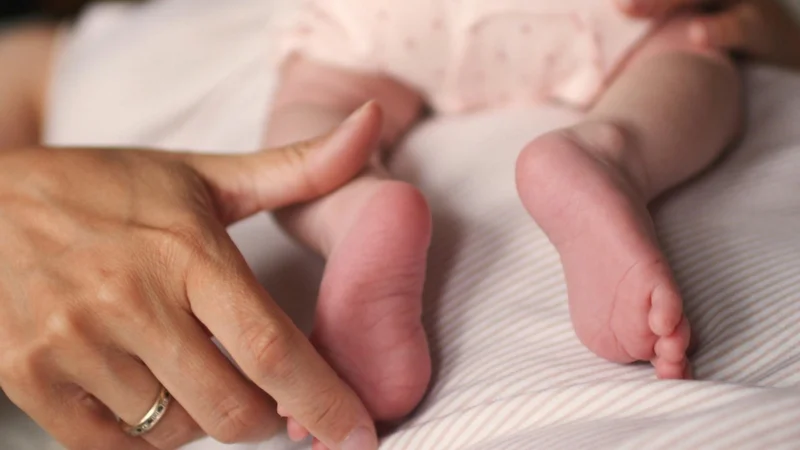Advocates for surrogacy in Ireland say they are concerned proposed new laws, which would ban compensation of surrogates abroad, could risk creating ‘hidden payments’ that could be used to coerce intended parents.
The legislative proposals, which are due before Cabinet in the coming weeks, will seek to regulate both domestic and international surrogacy arrangements involving Irish couples.
They include a proposal to ban any payment or compensation to a surrogate, beyond pre-agreed “reasonable expenses”.
Mary Seery Kearney, a Fine Gael Senator and a member of the Oireachtas Committee on International Surrogacy, told Prime Time she is concerned that if provision is not made in upcoming legislation for a “goodwill payment” to be given to a surrogate, it risks creating a system of “hidden payments”.
“If goodwill payments are included in the legislation, this will mean that the entirety of the transaction is transparent,” she said.
“It is my belief that for the regulation to work correctly it must honestly face the reality of such payments. Banning them won’t mean that no payment will be made, it will just mean that the payment will be under the table, leading to coercion of vulnerable intended parents. Transparency is the key.”
Senator Seery Kearney is not in favour of legislating for commercial surrogacy, which involves an agency being paid to facilitate a surrogacy arrangement. However, she said there should be provision for a ‘goodwill payment’ to be given directly to the surrogate from intending parents.
Sam Everingham, Global Director of Growing Families, an Australian organisation which provides advice to parents on international surrogacy, said Irish parents could struggle to find surrogates abroad at all if payments are banned.
“That’s unrealistic,” he said. “That’s really unrealistic to make that rule to… put our laws on another country. It’s just not culturally appropriate to say if a country like the USA believes compensation is fine from a moral point of view, I think you can’t say that’s not good enough for our citizens. What you’re doing then is you’re forcing a black market for people to go under the table.”
Questions have also been raised about Government plans to create a ‘green list’ of agencies or countries which the State has deemed to meet strict standards that will be imposed here.
Dr Andrea Mulligan, Assistant Professor of Law at Trinity College Dublin, says this will be very challenging. “I think Ireland can’t regulate what happens abroad, but what it can do is essentially avoid giving tacit acceptance to regimes that we think are problematic,” she said.
The surrogacy landscape is constantly changing. India has banned international surrogacy; Georgia will follow suit next year; while Ukraine – previously a very popular destination for Irish couples – is now not a safe option. Given that, it’s difficult to see how the Irish State will be able to keep track of what countries, or agencies, should be considered problematic.
This problem was starkly highlighted just last month in Greece, when eight people were arrested at a major fertility clinic in Crete, and are now under investigation for trafficking vulnerable women from countries like Georgia and Albania to become surrogates for foreign couples.
Police say the women were brought to Crete under false pretences and made to undergo hormonal treatments, egg extraction and insemination for surrogacy. Greek investigators claim the clinic has exploited more than 160 women, orchestrated illegal adoptions and offered counterfeit IVF treatment to intending parents. It was advertised widely on the internet, including on the Growing Families website, which said the Mediterranean Fertility Clinic had “an excellent surrogate support programme”.
During an interview following a recent conference in Dublin, Prime Time asked Sam Everingham why his organisation had recommended the clinic. He initially disputed that contention, saying his organisation does not recommend any clinic or agency, and that simply it provides information. However, after further questions he conceded that the language on his site represented a recommendation.
He said Growing Families was “hoodwinked” by the Mediterranean Fertility Institute for “years”.
“We’re horrified, horrified by what we saw coming out in the press there,” he said.
“It was just, for us and for doctors who’d also recommended that clinic to patients, it’s just something that’s come out of the blue. And we think, ‘how can an organisation be so deceptive to surrogates, to intending parents?'”
Mr Everingham also conceded that Growing Families cannot stand over the accuracy of any of the content provided on its website. He said the website constitutes a repository of information provided to it by others and therefore his organisation is not responsible for the veracity of the material provided.
At the heart of the proposals from government is an attempt to deal with the legal lacuna in which surrogacy currently exists. Under current Irish law, the woman who gives birth is always legally recognised as the mother. This means that when a surrogacy arrangement takes place – even when the egg and sperm of intending parents are used – it is the surrogate who is recognised in law as the child’s mother.
“A genetic father can apply to court for a declaration of parenthood, so he’s recognised as the father,” said Dr Mulligan. “An intended mother, even if she is the genetic mother, cannot get a parental recognition as the father can, so she can’t be recognised as a parent.”
Under proposed terms of the Health (Assisted Human Reproduction) Bill 2022, parents of children born through surrogacy will be recognised as legal parents, if they meet certain criteria in the jurisdiction in which the surrogacy is intended to take place, and also the criteria to be specified in the Irish legislation.
There is another problem, however. If Irish intended parents decide to ignore the new law, and go to a country where payment of the surrogate is permitted, or other strict Irish standards are not met, what happens then they return to Ireland with their newborn baby? Can Ireland refuse to grant a parental order?
It appears that is the plan.
An inter-departmental group charged with drawing up a policy paper for government on new surrogacy laws recommended that Irish courts should be “satisfied that all specified requirements are met before a parental order is granted”.
It also rejected a recommendation from the Oireachtas committee on surrogacy that judicial discretion should be allowed in exceptional cases.
Dr Mulligan broadly agrees with that approach: “Ultimately there will be surrogacy arrangements that are unethical, that are not compliant, and I think the State has to take a firm line in saying that they are ones that will simply not be recognised and state will care for that child in some other way,” she said.

However, Annette Hickey, a partner in Poe Kielty Hogan Solicitors in Kilkenny, who specialises in surrogacy, questioned whether refusing to grant a parental order to non-compliant parents is the right approach.
“The sanctions or the consequences, you keep coming back to, ‘hold on a second, that’s not good for the child, that’s not good for the child,’” she said.
“There has to be a means to ensure that whatever type of sanction, at the end of the day, the child has to be protected. When I look at it and study how this could actually possibly play out: it impacts the child. That is not what anyone wants.”

Prime Time has spoken to three couples who have opted for surrogacy arrangements abroad. Before embarking on the process, they were all keenly aware of bad actors seeking to take advantage of parents and surrogates.
They researched clinics thoroughly, and throughout the surrogacy arrangement they were fully satisfied that their surrogates were well cared for, that they were fairly compensated, and they were happy to participate in the process.
The risk of exploitation – particularly in international surrogacy – is one of the reasons they believe the proposed legislation is so important, to protect the surrogate and the intended families.
Brian and Kathy Egan had always planned to have four children. But after having their first son, Harry, Kathy had eight miscarriages.
They began to consider gestational surrogacy, the process where a woman agrees to carry and give birth to a baby via IVF using the egg and sperm of at least one of the intended parents.
“Because it’s new to you, you’re second-guessing everything, you really want to make sure you have the right information. It’s going to be the right clinic, the right surrogate, and everything is right for in every way,” Kathy’s husband Brian said.
Having researched clinics in the US and Canada, the Egans decided to go with a clinic in Lviv, Ukraine.
“We did Zoom or Skype calls with Mariana, our surrogate… She was in no doubt that this was helping us both,” Kathy said.
Mariana carried the baby that was made with Kathy’s egg and Brian’s sperm. Therefore, genetically, the baby which Marianna gave birth to is Brian and Kathy’s child.
Baby Luke arrived early May 2019 while Brian and Kathy were at home in Kilkenny. They travelled through the night to get to Lviv.
“You cannot get there quick enough. You’d swim there,” Kathy said.
The entire process cost the Egans about €100,000, including payment to the clinic, legal fees, flights, accommodation.
Senator Mary Seery Kearney did 13 rounds of IVF before considering surrogacy. When she began researching, she was dismayed to find there was no central agency or authority to contact for information. She had to rely on Google and eventually settled for the most impressive website; a clinic in Kyiv. “We flew over, we gave them €12,000 upfront, and nothing came of that,” she said.
After her experience in Ukraine, Senator Seery Kearney and her husband found a clinic in India.
“All in all, we’re looking about €38,000 to €42,000. So that’s eight years ago. Now [it] would be somewhere around 60 [thousand] as a starting charge. But then you have legal costs of at least another €10,000 on that,” she said.
Adding on accommodation and flights, the final cost was closer to €70,000.
Cathy and Keith Wheatley remortgaged their house to front the cost. They paid just under €40,000 to a clinic in Ukraine, of which €14,000 was compensation for their surrogate Ivanna.
But with legal fees, flights and accommodation, their total spend was €70,000.
None of the families who spoke to Prime Time ever expected to have to use a surrogacy arrangement to have a baby. The process takes a huge emotional and financial strain. And even after all that, mothers find themselves with no way to be recognised as such in Irish law.
The challenge for the Government now is to find a balance of legislation which ensures the safety and protection of Irish families and surrogates, while also being workable and realistic in the international context. It is not an easy task, but families and would-be parents are waiting.
“We’d hope that legislation is in place properly soon for us and for all those families out there that don’t want to be on this journey but want to make sure that things are right for everybody,” Brian Egan said.

